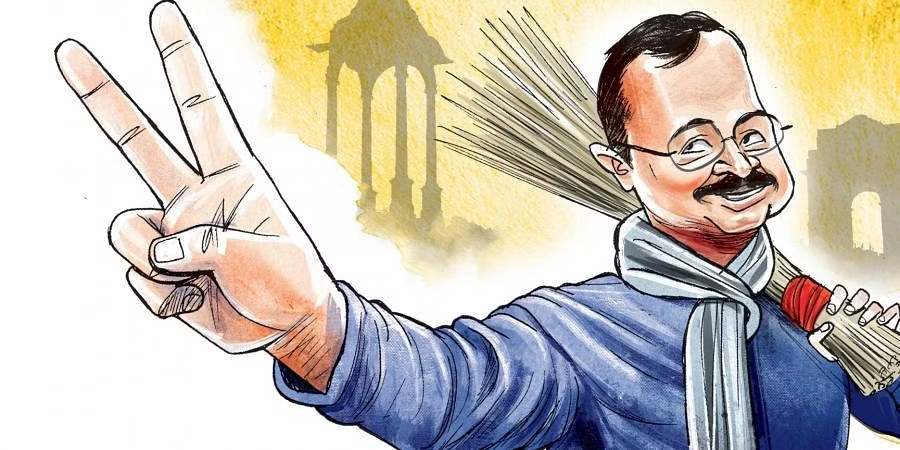The ‘PRASAD’ Of A Welfare State
- Hindu College Gazette Web Team

- Mar 9, 2023
- 7 min read
The India of today is progressing to prominence at the world level. Whether it be us achieving the fifth position amongst the world economies in terms of its economy size or building up defense commodities, we are passing with flying colors. We have been successful in providing vaccination cover to the world’s second most populous country in such a short span along with an adoptable model of COWIN, which was appreciated all over the world. We even witnessed strengthened diplomacy on the part of the government, be it the Doklam face-off in 2017, the overturning of the democratic government in Afghanistan, the Ukraine-Russia Conflict, or the governance discussions going on in Europe and the Americas with the curtain of NATO. All this proves our standpoint and makes us a prominent leader at the global level.
India has been functioning as a welfare state and has an outlook toward the upliftment of the people at large. There was a time in the 50s when we imported red wheat from the USA because of the low agricultural productivity here. Our literacy rate stood at just 12% at the time of Independence. The stride that we made from that time to the decade of the 60s was exceptional. The Green Revolution proved to be the reason for the progress of the Indian farmers from that pathetic situation. The innumerable schemes that were implemented over time have only improved our position. Take examples of the incentives that we have received like getting fertilizers from the government distribution centers or a waiver of the fees for the water taken from a canal for agriculture are some small steps that helped us achieve the level of agricultural production that we adore today. Pensions were never a ‘welfare’ scheme for retired employees but a token of courtesy for the elderly to sustain their lives after serving the government in any way. The government has always taken the help of such schemes in some way or the other but the coming up of words like revdi and freebies in the current context exaggerates the situation and even the utility of such schemes.
EVOLVING CONCEPT OF A WELFARE STATE

Image Credits : IMF eLibrary
In the year 2013, the Apex Court ruling in S Subramaniam Balaji vs The State of Tamil Nadu was revisited and honorable justice NV Ramana considering benches were some happenings in the current times that took this case to the eyes of popular media. In the very beginning, televisions were making a huge stride in the markets in the late 90s. In 1996, Jayalalitha made a promise of Providing color televisions to every household. She won the elections with a magnificent margin and fulfilled the promise with an amount of 4,000 Crore rupees. Providing kerosene oils for lamps in rural areas was once a genuine need. When the source of light in the night times has switched to the very revered product of Edison, the power source of the same electricity was subsidized in the name of development towards a modern world. With the turn of the century, we saw an ever-increasing trend of providing comfort in disguise of welfare. Let me take the state assembly elections in the most populous state of our motherland, the 2012 assembly elections saw the promises of laptops and cycles, which were well implemented. Undoubtedly, the girls who passed the intermediate examinations that year got a very important tool in the very changing times of the economic world, the scheme was appropriate to the transition in education methods they were going to encounter in life. Even the ambitious program of Digital India by the government in 2015 was a welcoming step and the laptop distribution system was empowered in the same paradigm. Even for this, we see banters being exchanged in the political domain. Moving further, electric rickshaws were even distributed by both governments after 2012 to the registered rickshaw pullers. This helped them to keep up with the changes in time. The government that won in 2017 came with the distribution of tablets and android phones. Along with all this, the establishment of the Aam Aadmi Party in 2012 as a byproduct of the Andolan for Jan Lokpal Bill was an important construction in contemporary times. This party went on to hold the governance of Delhi along with the INC for a short period. In near future, it jumped on to win exuberantly in the assembly elections with a fantastic sixty-seven assembly seats out of seventy in whole. This journey was important as the party turned out to be detrimental to the discussion and the media coverage around freebies. I see them as the pivot for all the hyper-exaggeration that makes up the discussion of freebies.

Image Credits : The New Indian Express
The party stood on the foundation of an anti-corruption movement, the very name of the party gave a sense of responsibility toward the citizens. They implemented some welfare schemes in the name of the public good. For electricity, up to three hundred units are being given free of cost to the residential meters across Delhi. Women in Delhi were allowed to travel in DTC buses without paying any charges, the reason given is a sense of security and the opportunity to come out in the public sphere. Water up to twenty kiloliters was given to the people without levying any charges. If we comprehend things according to classical economics, nothing can be free. Which is very true even with a practical lens. We see that this incurred charge is procured by us in some form or the other. Either it is covered by the revenue of the government or is just a transfer of funds, as is the case with the allocation amongst departments. This inherent cost is never visible on the forefront but is latent for the people at large. We see, in the case of Delhi, the whole electricity distribution was corrected and reviewed to ensure minimal line loss. The faulty meters were replaced and as a result; we saw a large amount of electricity being saved from unauthorized connections. Even we see that the supply remains the same, making the demands divided in different ways. This did not stop there but went on with the party to the assembly elections of Punjab, where similar announcements were made. To be mentioned, Punjab has some crucial fiscal deficits which are targeted to be 3.78% of the Gross State Domestic Product for the financial year 2022-23. Punjab is not the only state facing this issue. Several other states are encountering the same crisis. As far as we talk about welfare schemes, such steps by the government motivate the citizens to perform their part of the responsibility. This government-citizen trust is something that builds up with time. This sense of trust is essential in the maintenance of law and order and the overall progress of the region. We surely know that every facility has an inherent cost that is charged from us in some way or the other. When people get something for free, rather than to convey this in a better way; they are not charged for a service, they are motivated to bring that money to the market that promotes business and subsequently investment. This may be a very case-specific context. But it is a potential way of bringing funds into the market directly from the consumer’s end thereby promoting a practice that turns out to be healthy for the market at large. The arguments given in favor are that the citizens pay taxes for practically everything they consume, including the services they are provided with. So, they must not be compelled to pay for the facilities like electricity and water which are very necessities. The arguments in opposition call it the revdi culture, signifying the mere distribution of something dear to us for free, as if not being concerned about the safety or procurement of the same.

Image Credits : Rediffmail
When some people call it revdis being distributed, mere announcement of welfare schemes for the public good is seen as a way of swaying people for votes, an unhealthy practice in the festivals of democracy. Targeting others is very open and acceptable in democracies, but such mentions set an environment giving rise to the idea of political corruption. The announcements are overhyped to bring attention to their agendas which subsequently opens up the floor for heated arguments. We can see a very thin line between the welfare schemes and freebies, majorly nullified in the verbal political exchange. The things that are questioned are proving affirmative for the people at large and giving them a sense of self-reliance, promoting funds to be channelized to the markets. The thing that must be brought to concern here is that the habit of consuming resources for free makes us think of taking things for granted. This behavior can exploit the resources provided by the government. In the case here, the government provides incentives to MSME establishments for electricity. This is envisioned that they would grow into a large-scale industry with such support. Meanwhile, the enterprise may continue to function as an MSME for the electricity benefit but keep on increasing its production.
CONCLUSION
The thing that has to be made very clear is the behavior pattern arising out of an idea for support or public good at large. The attitude of people which is well evident in one of the dialogues of the movie Deewar (1975) by Amitabh Bachchan is, “main Aaj bhi fenke hue paise nhi uthata.” These lines had a sense of arrogance if understood in the first place but show some self esteem and reliance. The negation and unacceptance in reflex say it all. We cannot directly call the freebie agenda of political parties as some ‘thrown benefit’? By the way, welfare schemes can not be termed as the same directly. This cannot be made as a parallel unless and until the political parties exploit this method to muster votes. We can see a direct relation between the greed for coming to power and swaying people for the sake of their vote. The intention of framing such schemes is crucial in making it a part of manifestos.
The case of welfare schemes being termed as freebies is something that is overstretched or has to suffer red herring. The matter to understand here is to cause no harm to the state funds which are collected from the money of our much-respected tax payers and are intended at promoting the public good. The Supreme Court in the month of August threw light on the very fact and asked us to look at something really important, to leave it to a ‘wise generation’s response’. By and large, the onus lies on us to think about a scheme and decide its effects. Also, comprehending the schemes for the greater public good is necessary for society. We are the target audience of the schemes and are the ones who the government is accountable to. Either we see it as something of a benefit or a prasad offered by the government to sway us- it will be a contention in the political paradigm with us looking at it with some optimistic approach.
By Utkarsh Mishra
Hello everyone! This is Utkarsh Mishra currently in the second year of Philosophy honours course. I take keen interest in knowing about things and am an amateur in articles and papers.






Comments